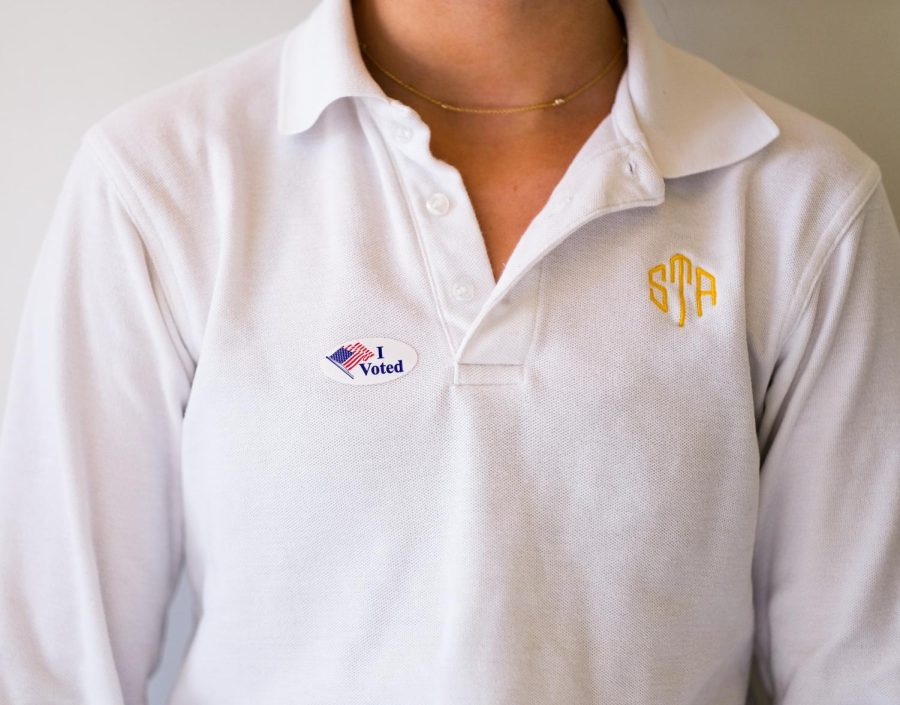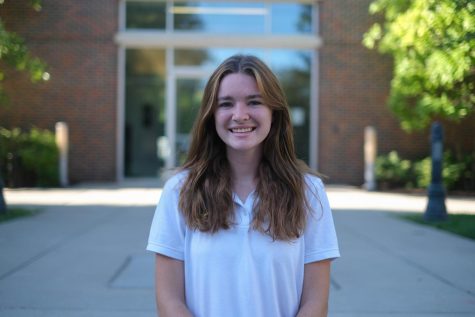Making Voices Heard
Participating in democracy for the first time with a tangible vote after turning 18 is an American privilege.
January 10, 2023
On November 8th, millions of voters lined up at their local polls to cast a ballot and participate in American democracy. Many first-time voters who had recently turned 18 got the opportunity to take part in this fundamental right for the first time, including select seniors at STA.
Election day fell on a block schedule day at STA and Senior Claire Coates voted before arriving at school, using her senior privileges that allow seniors to come to school late if they have a first period free. As she walked up to her polling location, there were signs all around advertising candidates and ballot issues, as well as people outside handing out flyers and asking voters to vote one way or another.
“I went in my uniform and some guy said ‘are you a first time voter?’ and I said yeah and then he yelled it to everyone and everybody clapped,” Coates said.
It’s no wonder that first-time voters get celebrated: only 27% of young people (those aged 18-29) turned out this year – yet still the highest turnout for a midterm in 30 years, according to National Public Radio (NPR). Government teacher Robert Flynn recognizes this lack of participation from younger generations and emphasizes his view that informed young voters are necessary for policy advancement.
“It’s especially important because my impression is that St. Teresa’s students are more aware than the average voter and we need more informed voters; we need that participation,” Flynn said. “It’s so disappointing when election after election youth voter turnout is really low. It doesn’t really seem to move the needle as much as it could. Old people turn out and vote; that’s why candidates or the representatives pick up phone calls from senior citizens and they listen to AARP and they protect Medicare and Social Security. There’s not that responsiveness to things that are important to young people because young people tend not to vote. Imagine how different the world could be, America at least could be, if [young people] had that kind of voting power. How much more seriously they’d be taken.”
Before the election, Flynn introduced conversations in his government classes surrounding certain ballot issues. He also offered voter guides unaffiliated with any party to new STA voters to help them research candidates and issues. Coates appreciated this guidance along with her own research that aided her in casting an informed vote on every issue.
“I got a voters’ guide from Mr. Flynn; I looked at the amendments and annotated them to try to understand where I stood,” Coates said. “I googled the people because I didn’t really understand who any of them were. I put it all in my notes app so that I knew what I wanted to vote for.”
Coates noticed the encouragement of older generations to get young people to vote.
“All of the people inside [the polls] were all older people working and they seemed really excited that a young person was voting,” Coates said. “Older people are worried about where the country is going so they’re excited to see that younger people care about the country.”
For Coates, voting means participating in something bigger than herself.
“I was honestly really excited to vote because I always talk about it,” Coates said. “I’ve been involved in politics, I’ve had opinions on politics and I could speak them but I couldn’t vote on anything; I couldn’t actually make that much of a difference so it was really exciting. I felt excited that I could finally vote.”
Turning 18 and getting the opportunity to tangibly make an impact and feel how her vote affects government is crucial to Coates.
“Voting means being able to put my opinions into words and actually try and make a difference with what I believe,” Coates said.
Aside from encouraging young people to vote, Flynn supports people of all ages going out to the polls and wishes more Americans would see voting as the privilege it is.
“It’s our chance to have a say,” Flynn said. “Most people who’ve come to this country came from places where it wasn’t so great for them for one reason or another. Could have been poverty, religious discrimination; we’ve got Central Americans coming here because their lives are in danger from street gangs, there’s just a whole host of reasons that bring people here. We have an opportunity to say how things are and that is really valuable. I wish more people saw it as the privilege that it is. Last election there was 50% turnout nationally. That means anything could have gone another way, perhaps should have been decided a different way. Yet 50% of people didn’t vote for whatever reason.”
Flynn’s mission has always been to help every person eligible to cast a vote that counts.
“I don’t really care how people vote, I do very deeply care that they do, that we pay attention; it’s really not that much to ask to go cast a ballot,” Flynn said.
Coates believes a central reason people don’t vote is the belief that their vote doesn’t matter.
“It’s easy to believe that what you’re voting on and what you’re doing isn’t actually going to make a difference, especially being that we’re younger,” Coates said “It’s important for people to participate to understand that change is possible.”
Flynn believes that especially since there are many countries where having a say in your own government is not guaranteed, Americans should not take democracy for granted.
“If you don’t vote, you don’t have a right to complain,” Flynn said. “If you do want a right to complain, vote. If you like to complain, go vote. If you don’t, you really don’t have the right to complain. You had an opportunity and didn’t take it, didn’t exercise it. It’s power.”
To aid in the voting process, Flynn organized for a group of four seniors to volunteer at the polls on election day. Funds raised were donated to the League of Women’s Voters to fight for voting rights. Senior Greta Zinn was among the volunteers and being too young to vote herself, she saw this as the perfect opportunity to have an impact.
“It’s made me more educated about the political scope of our community,” Zinn said. “It’s crazy to me that I feel so educated in the classes I’ve taken, for example government, and I love to learn about it but I’m not even allowed to be a part of this yet. It’s weird. I thought it was really interesting and that’s why I was glad I got the experience to learn more about the specifics of voting.”
Volunteers were at the polls from 6 a.m. to 8 p.m. with the biggest rushes of voters being from 7 a.m. to 7:30 a.m. and 4 p.m. to 4:30 p.m. Although it was a long day, Zinn recommends this experience to anyone considering it and would participate herself again in the future.
“It’s a great experience to learn about, especially if you’re underage and you’ve never voted before, or even if you have, just to see the background; all the work that these people put in, it’s actually really inspiring,” Zinn said. “People do this every single election. There were people who had worked in elections since the 1990s, it’s great because it’s really important to be involved in our government and that’s just one way you can do that.”
The most memorable thing Zinn experienced during her time volunteering involved a political candidate.
“Amanda Atkins was running in Kansas and the news channel came in while I was the check-in person and asked if they could film her checking in and voting,” Zinn said. “I said to tell her to come to my station when she comes. So the newscaster guy is like ‘okay, I got you.’ So she came in at 10 and I had been checking in for about three hours so I was in a daze. I ask her for her name and ID and I scan her license and it was expired. I say ‘your license is expired, what’s your name?’ and then she says ‘Amanda Adkins’ and I’m like, ‘wait what?’ I look up and the camera is on me. So then she pulls out her temporary license, she got it renewed but she hadn’t gotten it yet, but it was just funny. I checked in someone that was running for that election so it was cool.”
Flynn finds what the four student volunteers have done to be inspirational.
“They’re heroes; it’s awesome, I’m really proud of them,” Flynn said. “They had great experiences and fun stories and I’m really proud that they would want to go do that. The wages that they earned we’ll get to donate to the League of Women Voters to expand voting rights. The whole thing is pretty special. Especially given the tie between the League of Women Voters’ mission and the fact that it’s an all girls institution. Women have only had the right to vote for 102 years, only around 40% of America’s history, which is crazy to think about. In the grand scheme women’s involvement in American politics in the government is relatively recent.”
Looking up at the pictures of influential women in American history from the first woman on the Supreme Court Sandra Day O’Connor, to the first woman vice president Kamala Harris, displayed on the wall in his classroom, Flynn reflects on the history of women’s participation in politics.
“For those four [students] and how they can get out and exercise their rights, participate, see and experience, I’m really proud of them and it’s something they’re going to look back on as a great experience and maybe even formative for how they think of the world at large,” Flynn said.
There was one final urgence Flynn wished to leave students with.
“Go register to vote,” Flynn said. “You can do it when you’re 17 and a half. Do it now if you’re 17 and a half. Today.”




